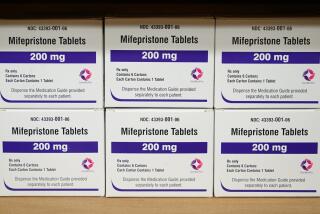ImClone’s Erbitux Approved by FDA
- Share via
Erbitux, the cancer drug at the center of the ImClone Systems Inc. stock-sale scandal, was approved for sale by the Food and Drug Administration on Thursday.
The action came more than two years after the agency refused to consider the drug, and company founder Samuel D. Waksal tried to sell his ImClone shares before he told investors the bad news.
Waksal is in prison and his friend Martha Stewart is on trial after allegedly relying on inside information to sell her shares. She has pleaded not guilty to obstruction of justice and securities fraud charges.
“The approval of Erbitux is a defining moment for ImClone Systems and, more importantly, represents a new option for colon cancer patients,” ImClone Chief Executive Daniel S. Lynch said.
In a strange echo of the company’s earlier stock woes, Nasdaq executives halted trading in ImClone’s shares shortly before the Erbitux announcement, as the stock plunged $9.99, or 23%, to $33.11 on rumors that the FDA wouldn’t approve the drug.
When trading resumed after hours, after the Erbitux news was announced, the stock rocketed back above $43, and was trading at $44.05 late in the day.
Nasdaq notified the Securities and Exchange Commission that it was looking into the cause of the plunge before the trading halt took effect, SEC spokesman Herb Perone said. He declined to say whether the SEC was investigating.
It’s common practice for the SEC, Nasdaq and the National Assn. of Securities Dealers to investigate trading before a halt, a Nasdaq spokeswoman said. Nancy Condon, an NASD spokeswoman, didn’t return a phone call.
In mid-2002, ImClone traded below $7, down from the mid-$70s, after the company’s regulatory and legal problems became known. Martha Stewart had sold her shares at $58.43 the day before ImClone revealed the FDA had rejected its Erbitux application. ImClone announced the news after the market close on Dec. 28, 2001. The next trading day, the shares plummeted 16%.
The agency approved Erbitux for colon cancer patients after reviewing data that showed the drug shrank tumors in about 20% of patients in a clinical trial.
The drug does not cure cancer. But three years ago, reports circulated about patients whose tumors had all but disappeared.
Analysts said the drug could achieve annual sales of $500 million to $1 billion for use against colon cancer and as much as $1.5 billion if it turns out to be useful against other tumors. But Erbitux will face stiff competition from Avastin, a Genentech Inc. colon cancer drug that is expected to reach the market by April.
Erbitux eventually could face competition from a similar drug being co-developed by Amgen Inc. of Thousand Oaks and Abgenix Inc. of Fremont, Calif.
ImClone was the toast of the biotechnology industry, based on hype about Erbitux. ImClone once predicted the drug would have sales of $1.5 billion by 2005 -- now considered an unlikely scenario.
On Dec. 26, 2001, Waksal learned the FDA would reject ImClone’s Erbitux data. He leaked the news to two family members who sold shares worth $10.5 million. Waksal was unable to sell his stock.
Times staff writer Jonathan Peterson contributed to this report, and Times wire services were used in compiling it.
More to Read
Inside the business of entertainment
The Wide Shot brings you news, analysis and insights on everything from streaming wars to production — and what it all means for the future.
You may occasionally receive promotional content from the Los Angeles Times.










